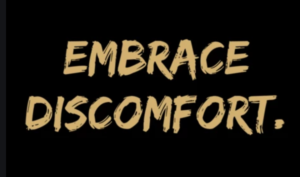
“Leadership is turning toward the discomfort
that everyone else avoids.”
Two days ago I received an email from my coach encouraging me to enter, “The Discomfort Zone”. It almost makes you laugh to think that someone would invite you to experience discomfort, but the reality is, it’s a necessary step that must be taken for improvement. It’s also something most of us won’t do unless prompted. In my case I needed to come to grips with the reasons I was avoiding certain workouts and some issues with my dietary habits. In both cases it came down to discomfort; I avoided certain exercises because they were taxing, difficult, and at times painful. Likewise I avoided certain foods simply because I was comfortable with the less healthy alternative. I also learned that there were emotional factors that drive my behavior, impact my selection of a workout, and can even fuel a food desire. So why is this important? Because embracing discomfort enables us to become stronger, not only personally, but as leaders who serve others.
Understanding this idea of embracing discomfort was partially facilitated through my coaching program. My coach asked me to consider the following:
Scenario 1 – You come upon a house and see flames coming from an upstairs window. The lot is overgrown with shrubs and weeds, and the house appears vacant. Knowing you might get burned or worse, do you run inside to check on the off chance that someone might be there? In all probability not, rather, you dial 911 and report the fire.
Scenario 2 – You come upon a house and see flames coming from an upstairs window. Children’s toys fill the yard and you think you heard a baby’s cry. You dash inside the house, forgetting about your own safety, desperately searching for the child. You find the baby, grab her, and bring her outside. At this point you’re probably suffering burns and smoke inhalation. Do you care much about your discomfort? Not in that moment. In fact, your adrenaline is so high you might not even feel the pain at all; the only thing you care about is that the baby is safe.
What accounted for the difference in behavior? It’s simple, we are willing to tolerate discomfort in the service of a higher purpose. There are some important lessons that can be drawn from these two stories:
-
Discomfort is negotiable – What we feel will depend on our focus.
-
We can deal with discomfort – If we act in the service of a higher purpose, we can easily tolerate discomfort.
-
Sometimes, we need to deal with discomfort – It’s non-negotiable, so we might as well get good at it now.
-
Discomfort, in the right amount, makes us stronger – You just saved a baby from a fire. Now the rest of your life probably seems a lot easier.
-
We already have everything we need to be able to tolerate discomfort – We just need to practice tapping in to our natural abilities.
-
To change your experience of discomfort, find your bigger purpose and focus on it – Why are you here? Now go deeper, why are you really here? Stay focused on that.
As I reflected and read more on this idea of discomfort as a means of growth I came upon Peter Bregman’s post in HBR entitled, “Why Leaders Must Feel Pain”. Bregman recounts his experiences upon returning from a leadership workshop that required him to consider, and feel deeply, the emotions he had spent his life avoiding, like the pain of failure and loss. He shares, “Every leader is a human being and when we avoid feeling the suffering we naturally experience as human beings, we perpetuate it and act against our best interests in our relationships with our colleagues and the people we manage, as well as with our families. Bregman came to understand that the act of diving deeply into the feelings we avoid, and sometimes the feelings we don’t necessarily even know we have, is a first step in becoming a better leader. The solution he proposes takes a page from the work of Brene’ Brown (Daring Greatly). He challenges us to experience our feelings deeply, to embrace the pain and discomfort, to let ourselves be vulnerable. He shares, “We cannot lead without feeling the pain of living because the things we do to avoid feeling pain result in poor leadership; we don’t acknowledge others, we try to control everything, we lose our temper and criticize others disproportionately. If we don’t feel our emotions, we are controlled by them.”
We’ve all heard the saying, “What doesn’t kill us makes us stronger.” It begins by embracing discomfort as a means of growing, not only as a leader, but as a spouse, parent, colleague and friend.
Embrace the Discomfort
Embrace the Challenge
